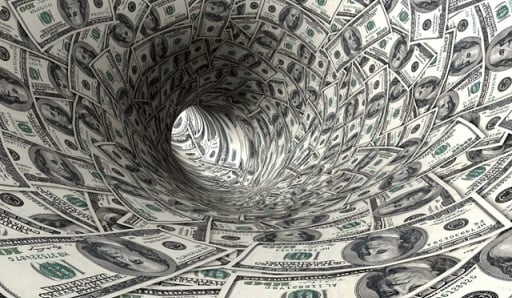Submitted for your approval: A most unusual investment theory
Despite assurances from Ben Bernanke and most mainstream economists, I'm convinced the economy's in the Dumpster and not headed anywhere great, anytime soon. In fact, I think it could get much worse.
Full disclosure: My everything-is-going-to-hell fears stem, I think, from childhood trauma induced by “The Twilight Zone.”
One show in particular forever shaped my thinking. Called "Time Enough at Last,' it was the one in which a quiet bank teller who loves to read and write poetry sneaks off to the bank's vault with a book during his lunch break. The character, played by Burgess Meredith, is knocked unconscious by a blast, and wakes up to find that he is the lone survivor of a nuclear war (which, oddly, leaves everything pretty much intact and untainted by radiation). After he gets over the shock, he realizes that the public library — with all its books — is still standing, and that he is free to read to his heart's delight. At that moment, however, he breaks his thick glasses and is left totally alone and isolated.
That story scared the bejeezus out of me. And it left me with the nagging fear that some cruel twist of fate would inevitably come along to make a mockery of my plans.
On the economic front, I will forever believe that whatever investment decisions I make, they'll be wrong. A derivative of that logic makes me question the mainstream economic and market consensus. If all the big shots are convinced that X, Y and Z are true, they can't be right.
Anyone remember Okun's Law? In 1962, economist Arthur Okun said that a one percentage point increase in the unemployment rate is associated with two percentage points of negative growth in real GDP. To an economics profession more passionate about parsing data than observing ordinary humans in the marketplace, Okun's Law was just as real as Newton's.
But if Okun's Law was correct, unemployment today would be about 8%, not the 10% or 12% (or more) that it actually is. So much for economic law.
(In defense of the poor late Mr. Okun, let me say that he probably would have been shocked at the profitability of corporate America through the recent recession — a result, largely, of skimpy investment in new activity and transferring the pain to workers, or I should say, ex-workers.)
Mainstream economic thinkers today believe that the government's current spending spree will inevitably result in inflation — either through rising interest rates as the government outbids the private sector for funds or through outright monetary creation, or both.
A small, but growing, chorus of economists and others believe that deflation, a la Japan, is also a possibility. In this scenario, the economy's animal spirits remain depressed, business is loath to invest, consumers buy only when prices are lowered, and China's relentless manufacturing machine keeps churning out cheaper and cheaper goods.
Since deflation is supposed to be as unlikely as a hurricane in Montana, my bet is that deflation is what's coming.
But since I'm always wrong, I wouldn't rule out inflation, either.
And since no one is expecting it, I bet we get deflation and inflation together. Here's what that would look like:
We'd get deflation in everything that affects the middle class: depressed housing prices (yes, this would help newcomers, but would sink the retirement plans of boomers), high unemployment and lower incomes. And we'd see inflation in areas that would be equally painful — higher medical and educational costs, higher interest rates and higher prices for oil, which is denominated in dollars that would be depreciating.
Of course, economists will tell you that simultaneous inflation and deflation is impossible. I bet Rod Serling would think otherwise.







